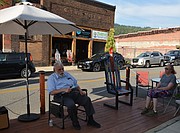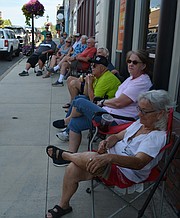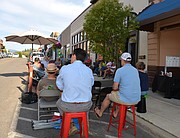Front Porch Conversation: Duane Little tackles family connection to mining wars of 1899
KELLOGG — For the fourth week of Front Porch Conversations, bits and pieces of captivating local history were teased out during Duane “Duke” Little’s talk Wednesday at 125 McKinley Ave. in Kellogg.
When Little was young, the freezer space in refrigerators was so small it made more sense to rent frozen storage space in town. “The refrigerator freezer was big enough to hold an ice tray and maybe a quart of ice cream, so everybody went to the Locker Plant,” Little said.
For a brief span of time in his youth, Little recalls when slot machines were still legal in Idaho. They were only allowed in the state for about five years, but their novelty from 1947 when they were introduced to the time they were declared illegal in 1953 marked the rapidly changing times. There were reports across the state at the time of machines thrown in rivers and others that were stolen with the hopes of continuing their use in secret, but nearly just as soon as they arrived on the scene, they were taken out of play.
The major topic looming on Little’s mind, however, was the mining war of 1899.
"They originally imprisoned people in boxcars, but then they built these bullpens and everybody who even thought of joining the union was thrown in, there was no habeas corpus,” Little said.
Little has a family connection to the 1899 mining union troubles through his grandfather. During the strike, miners wanted 50 cents more a day than they were receiving, and the Bunker Hill mining company maintained that they would keep the pay rates the same. It didn't take long before the mining company’s refusal to accommodate the workers resulted in tense escalations with workers that attracted the attention of the governor.
”Something had to be done, people thought, so they called the governor, and they declared martial law and the federal troops came in. All the troops who would usually come were involved in the Spanish-American War, so they had the colored soldiers, the Buffalo troops come in here," Little said.
According to the Library of Congress records of the miners' battle with Bunker Hill, union workers seized a Northern Pacific train April 29, 1899, in Burke and drove it to Wardner, the site of a $250,000 mill of the Bunker Hill mine, detonating over 50 boxes of dynamite under one of the world’s largest mining concentrators, destroying the device.
“It just so happens that my grandfather, who my family said he had no connection to it, though I don’t know. They say he was up at the step mine, but he was imprisoned with everybody else,” Little said.
In November 1899, 10 union workers were convicted and three were acquitted on charges of conspiracy and of stopping a U.S. mail train.
“They had to find somebody guilty of something, so they rounded up 10 single immigrants, since nobody would care about single immigrants, except for my grandfather, who was married two weeks before that," Little said. "They sent him out to the federal courthouse and got them all convicted of a charge of waylaying United States mail, and sent them all off to San Quentin.”
The story didn’t end there for Little’s grandfather, however, and thanks to a newly formed mining union, a new attorney was able to set about finding a way to have the workers released from their sentences.
“After about nine months in San Quentin, the Western Federation of Miners, which was a big union, hired them a new attorney and got them all acquitted. The lawyer apparently proved that the mail got to Irwin. So my grandpa was released in San Quentin with a new suit and $5, but he had to work enough down there to get home,” Little said.
If you go
There has been an adjustment to the speaker schedule for the remaining Front Porch Conversations, and Juli Zook and Mike Pierce will be speaking at the next talk Wednesday.
What: Front Porch Conversations
When: 5:30 p.m. Wednesdays, July 12 through Aug. 16
Where: 125 McKinley Ave., Kellogg
Speakers:
Aug. 9: Juli Zook and Mike Pierce
Aug. 16: Paul and Carol Roberts







